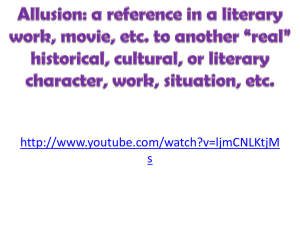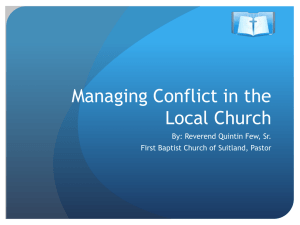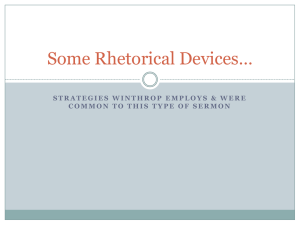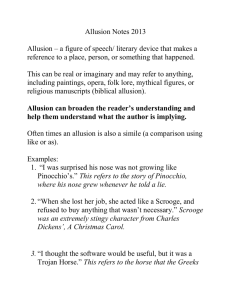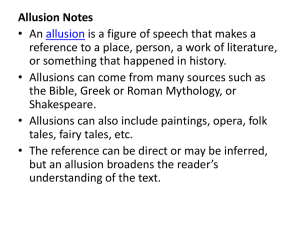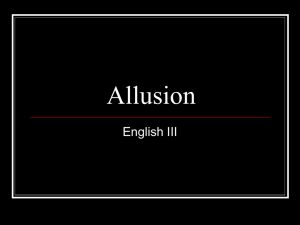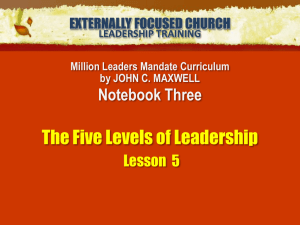Abraham - Archetypal patriarch. One of the most important figures of
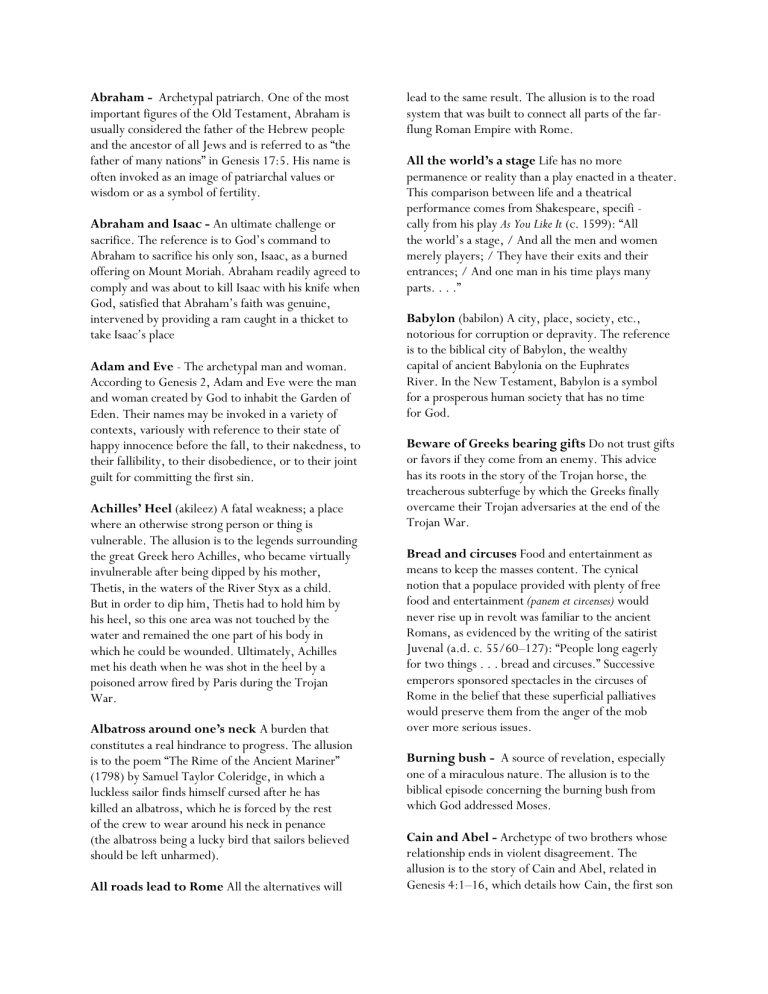
Abraham - Archetypal patriarch. One of the most important figures of the Old Testament, Abraham is usually considered the father of the Hebrew people and the ancestor of all Jews and is referred to as “the father of many nations” in Genesis 17:5. His name is often invoked as an image of patriarchal values or wisdom or as a symbol of fertility.
Abraham and Isaac - An ultimate challenge or sacrifice. The reference is to God’s command to
Abraham to sacrifice his only son, Isaac, as a burned offering on Mount Moriah. Abraham readily agreed to comply and was about to kill Isaac with his knife when
God, satisfied that Abraham’s faith was genuine, intervened by providing a ram caught in a thicket to take Isaac’s place
Adam and Eve - The archetypal man and woman.
According to Genesis 2, Adam and Eve were the man and woman created by God to inhabit the Garden of
Eden. Their names may be invoked in a variety of contexts, variously with reference to their state of happy innocence before the fall, to their nakedness, to their fallibility, to their disobedience, or to their joint guilt for committing the first sin.
Achilles’ Heel (akileez) A fatal weakness; a place where an otherwise strong person or thing is vulnerable. The allusion is to the legends surrounding the great Greek hero Achilles, who became virtually invulnerable after being dipped by his mother,
Thetis, in the waters of the River Styx as a child.
But in order to dip him, Thetis had to hold him by his heel, so this one area was not touched by the water and remained the one part of his body in which he could be wounded. Ultimately, Achilles met his death when he was shot in the heel by a poisoned arrow fired by Paris during the Trojan
War.
Albatross around one’s neck A burden that constitutes a real hindrance to progress. The allusion is to the poem “The Rime of the Ancient Mariner”
(1798) by Samuel Taylor Coleridge, in which a luckless sailor finds himself cursed after he has killed an albatross, which he is forced by the rest of the crew to wear around his neck in penance
(the albatross being a lucky bird that sailors believed should be left unharmed).
All roads lead to Rome All the alternatives will lead to the same result. The allusion is to the road system that was built to connect all parts of the farflung Roman Empire with Rome.
All the world’s a stage Life has no more permanence or reality than a play enacted in a theater.
This comparison between life and a theatrical performance comes from Shakespeare, specifi - cally from his play As You Like It (c. 1599): “All the world’s a stage, / And all the men and women merely players; / They have their exits and their entrances; / And one man in his time plays many parts. . . .”
Babylon (babilon) A city, place, society, etc., notorious for corruption or depravity. The reference is to the biblical city of Babylon, the wealthy capital of ancient Babylonia on the Euphrates
River. In the New Testament, Babylon is a symbol for a prosperous human society that has no time for God.
Beware of Greeks bearing gifts Do not trust gifts or favors if they come from an enemy. This advice has its roots in the story of the Trojan horse, the treacherous subterfuge by which the Greeks finally overcame their Trojan adversaries at the end of the
Trojan War.
Bread and circuses Food and entertainment as means to keep the masses content. The cynical notion that a populace provided with plenty of free food and entertainment (panem et circenses) would never rise up in revolt was familiar to the ancient
Romans, as evidenced by the writing of the satirist
Juvenal (a.d. c. 55/60–127): “People long eagerly for two things . . . bread and circuses.” Successive emperors sponsored spectacles in the circuses of
Rome in the belief that these superficial palliatives would preserve them from the anger of the mob over more serious issues.
Burning bush - A source of revelation, especially one of a miraculous nature. The allusion is to the biblical episode concerning the burning bush from which God addressed Moses.
Cain and Abel - Archetype of two brothers whose relationship ends in violent disagreement. The allusion is to the story of Cain and Abel, related in
Genesis 4:1–16, which details how Cain, the first son
of Adam and Eve and described as a “tiller of the ground,” came to murder his brother Abel, a shepherd, through envy.
City on a hill Utopia; a utopian community or shining example of some kind. The phrase comes from Christ’s Sermon on the Mount: “Ye are the light of the world. A city that is set on an hill cannot be hid. Neither do men light a candle, and put it under a bushel, but on a candlestick; and it giveth light unto all that are in the house.
Let your light so shine before men, that they may see your good works, and glorify your
Father which is in heaven” (Matthew 5:14–16).
Coat of many colors - A multicolored garment.
The original coat of many colors was the coat presented by Jacob to his favorite son, Joseph, as a sign of his special love for him, as related in Genesis
37:3: “Now Israel loved Joseph more than all his children, because he was the son of his old age: and he made him a coat of many colours.” The gift made
Joseph’s brothers so jealous that they stole the coat, stained it with blood, and told their father that Joseph had been killed by wild animals, while selling Joseph into slavery.
Crocodile tears Insincere, hypocritical tears. The allusion is to the traditional story that the crocodile makes pitiful sobbing sounds to deceive its prey into coming close enough to be snatched up in its jaws.
Crossing of the Red Sea A miraculous escape, especially one made with divine assistance. The allusion is to the crossing of the Red Sea by the
Israelites from Egypt to Sinai, under the guidance of Moses. According to the biblical narrative, the waters of the Red Sea parted at Moses’ command but closed behind them, blocking the Egyptians who followed in pursuit (Exodus 14:21–30).
Cross the Rubicon (roobikon) To take an irrevocable step, especially a decision from which there is no going back. Under the laws of ancient
Rome it was illegal for a military commander to lead troops over the Rubicon River, which divided
Cisalpine Gaul from Italy.
Cut the Gordian knot (gordeean) To take a direct route in solving a complex problem. The allusion is to the story of the intricate knot with which
Gordius, a peasant who became king of Phrygia, attached his wagon to the yoke. It was said that any person who could untie the knot would become ruler of all Asia. When Alexander the Great was presented with the challenge of unloosing the knot he simply cut through it with his sword.
David and Goliath - A contest in which the two sides are unequally matched. The allusion is to the biblical story of David, a humble but devout shepherd boy, who alone faces and defeats the Philistine giant goliath by killing him with a slingshot
David and Jonathan - The epitome of close friendship between two members of the same sex.
The biblical hero David, Saul’s heir, and Jonathan, the son of Saul, are described as inseparable companions
Dog in the manger, A person who selfishly prevents others from enjoying what he or she cannot enjoy himself or herself. The expression comes from a fable by the Greek writer Aesop (620–560 b.c.) in which a surly dog sits on a pile of hay in a manger, preventing some cows from eating it, even though he cannot eat it himself.
Down the rabbit hole Into a weird or surreal situation. The allusion is to Lewis Carroll’s Alice’s
Adventures in Wonderland (1865), in which Alice finds herself in a strange fantasy world after following the White Rabbit into its rabbit hole.
Exodus - A mass migration or departure. The word comes from the Greek exodos (meaning “marching out”) and in the Old Testament describes the departure of the Israelites from Egypt (Exodus
12:31) under Moses and their subsequent 40- year wanderings in the wilderness before coming to the promised land.
Fallen angel A person who has suffered a lapse in fortune or reputation. The original fallen angels were Lucifer and other rebels, who according to
Christian tradition tried unsuccessfully to overthrow
God and were consequently consigned to hell, as related in Isaiah 14:12 and Revelation
12:7–9.
Fall of a sparrow Even the most insignificant events are not outside the care and knowledge of
God (or others in authority), who governs everything.
The phrase comes from Matthew 10:29–31
Fat of the land A life of luxury. The expression comes from Genesis 45:18, in which Pharaoh offered the brethren of Joseph the best treatment:
“I will give you the good of the land of
Egypt, and ye shall eat the fat of the land.”
Feet of clay A fundamental character fl aw, especially one that is not immediately obvious in someone or something that is otherwise greatly admired. The allusion is to Daniel 2:31–33, which relates a dream in which the Babylonian king
Nebuchadnezzar dreamed of a huge figure with a head of gold, breast and arms of silver, belly and thighs of brass, legs of iron, and feet of iron and clay. When the feet are smashed by a stone, the whole statue falls. Daniel explained the image as a symbol of Nebuchadnezzar’s empire and the feet of clay as a representation of the inherent weakness that would lead to its collapse.
Feeding the five thousand The providing of food or something else for a large number of people.
The reference is to the miracle of the loaves and fishes related in Matthew 14:13–21, in which
Christ miraculously fed a crowd of 5,000 people with just five loaves and two fish—and had several baskets of food left over after all had eaten.
Fiddle while Rome burns To occupy oneself with trivialities while ignoring a much more serious problem. The allusion is to the tradition that in the year a.d. 64 the emperor Nero (who considered himself a fine musician) played his fiddle rather than take action to prevent the city of
Rome from being destroyed in a disastrous fire.
Rumors that Nero had started the fire himself to clear a large area for his own ambitious building plans added to the resentment felt against him for this callousness (even though he was not apparently in the city at the time the fire broke out), and his reign only lasted another four years, despite his attempts to transfer the blame for the conflagration to the city’s Christian population.
Fiery furnace - A punishment that rebounds on the persons inflicting it while leaving its intended victims unscathed. The allusion is to the biblical story of
Shadrach, Meshach, and Abednego, who were hurled into a fiery furnace on the orders of King
Nebuchadnezzar after they refused to worship a golden idol set up by him. According to the account given in Daniel 3, the three remained miraculously unharmed by the flames, although the people who threw them in were all scorched to death.
Four Horse men of the Apocalypse - Personifi cations of war, famine, pestilence, and death. The
Four Horse men of the Apocalypse are described in the book of Revelation 6:1–8, in which John foresees the end of the world. According to this account, War rides a white horse, Pestilence (or strife) a red horse,
Famine a black horse, and Death a pale horse
Garden of Eden - Paradise or some other unspoiled, idyllic place, or a state of perfect bliss or innocence. The biblical Garden of Eden, from which
Adam and Eve were expelled after disobeying God’s command not to eat from the Tree of the Knowledge of Good and Evil, is described briefly in Genesis:
“And the LORD God planted a garden eastward in
Eden; and there he put the man whom he had formed.
And out of the ground made the LORD God to grow every tree that is pleasant to the sight, and good for food; the tree of life also in the midst of the garden, and the tree of knowledge of good and evil. And a river went out of Eden to water the garden
Golden calf - Money, riches, or material values.
The description of the golden calf comes from the biblical episode related in Exodus 32:1–14 in which the Israelites worshiped such an idol, made by Aaron from golden earrings, in the absence of Aaron’s brother Moses. In modern usage people who place undue emphasis on the pursuit of material values may be accused of worshiping the golden calf
Golgotha A place or experience that causes intense suffering, especially mental anguish.
In the Bible, Calvary is identified as the hill in
Jerusalem upon which Christ was crucified (Luke
23:32). The actual site of Calvary is disputed, with some identifying it with a vaguely skull- shaped hill near the Garden of Gethsemane and others indicating the site of the Church of the Holy Sepulchre. Legend has it that the skull of Adam was kept at the church.
Good Samaritan - A person who kindly and selflessly helps a stranger in distress or difficulty. The expression alludes to the parable that Christ told, recorded in Luke 10:25–37, about a Jew who was brutally attacked while on his way from Jerusalem to
Jericho and left for dead. His plight was ignored by a priest and a Levite who passed by on the other side without giving him any help at all. But later a
Samaritan who happened by took compassion on the man, and in spite of the fact that the Samaritans were open enemies of the Jews, the Samaritan looked after him, paying an innkeeper to take care of him.
Hoist with one’s own petard Caught out by one’s own cleverness or scheming. The allusion is to medieval siege warfare and the use of a petard (a primitive explosive device) to blow up defensive works: the device was notoriously unpredictable and often exploded prematurely, blowing up the engineers who had set it.
Holy grail A final goal or destination achieved only with much difficulty; the object of a quest, especially one of a mystical or mythical character.
The original Holy Grail was the cup or dish supposedly used at the Last Supper and also by Joseph of Arimathea to catch the blood dripping from the crucified Christ. Traditionally it is thought to have been brought in the first century a.d. to Glastonbury,
En gland, by Joseph of Arimathea. The Grail became an object of great veneration in medieval times
A house divided against itself Those who cannot agree among themselves cannot expect to succeed.
The expression comes from Matthew 12:25, in which
Christ responds to the accusations of the Pharisees that he had drawn on the powers of the Devil to achieve the miraculous healing of a deaf and mute man, pointing out that evil would hardly seek to destroy evil: “Every kingdom divided against itself is brought to desolation; and every city or house divided against itself shall not stand.” Similar sentiments are expressed in Mark 3:25: “If a house be divided against itself, that house cannot stand.”
Hyperion to a satyr (hipeereebn, sayter) A contrast between two opposites. In Greek mythology,
Hyperion was one of the Titans and the father of
Helios (the Sun), Selene (the Moon), and Eos (the dawn). His name is sometimes employed as a synonym for the Sun itself. In contrast to the Titan satyrs were much more humble, sylvan gods, who were half human and half goat. This expression was popularized by William Shakespeare, who used it in
Hamlet (c. 1600), in the course of Hamlet’s first soliloquy: “So excellent a king; that was, to this,
Hyperion to a satyr.”
Ides of March (idz) A day of reckoning, especially one that has been foretold. In ancient Rome, the Ides
(from the verb iduo, meaning “to divide”) marked the halfway point of a month. It was on the Ides of March
(March 15) that Julius Caesar was murdered in the
Capitol, as previously prophesied by a soothsayer with the doom- laden words “Beware the Ides of March.”
Ishmael (ishmaybl) A social outcast. Ishmael appears in the Bible as the son of Abraham and
Hagar, who was the Egyptian maidservant of
Sarah. According to Genesis 16–25, Sarah allowed
Hagar to become pregnant by Abraham as she believed herself barren, but the two women quarreled, and after Sarah gave birth to Isaac, Hagar and her son were thrown out of the house and sent into the desert, hence the adoption of Ishmael’s name (or the term Ishmaelite) for anyone who is expelled from society. God saved the pair from death from thirst by providing them with a well of water. Ishmael in his turn had 12 sons. The
Ishmaelites were a tribal people who lived in Edom
(Psalm 83:6); God’s promise that Ishmael’s descendants would become a great nation (Genesis
17:20; 21:17–18) has traditionally been thought to be fulfilled through the Arab peoples.
Jephthah’s daughter (jepthbz) A chaste woman; a virgin. According to the account given in Judges
11:29–40, Jephthah was a judge of Israel who vowed to sacrifice the first living thing he met on returning home should he be victorious in battle against the
Ammonites. He won the battle but on returning home was aghast to be greeted by his own unmarried daughter. The girl was allowed two months in which to go into the mountains and lament the fact that she would die a virgin and was duly sacrificed at the end of that time.
Jeremiah A lengthy lamentation about life or a gloom- laden prophecy of disaster. The word is derived via French from the name of the
Old Testament prophet Jeremiah, who is remembered for his stern warnings to Judah of God’s judgment against idolatry, immorality, and false prophets (as in chapters 10, 14, and 16). Jeremiah became very unpopular (being thrown into prison and into a cistern) and was known as the Prophet of Doom. “Jeremiah also spoke about a fresh hope.
He promised a new and lasting covenant which
God would write on his people’s hearts, characterized by the inwardness of genuine faith. . . . He also spoke of the restoration of Jerusalem, which
Jeremiah symbolized by buying a plot of land as the Babylonians besieged the city . . . and of a new king in David’s line to replace the corrupt monarchy of his own day” (Selman and Manser,
Hearthside Bible Dictionary, p. 122). Even today any person who complains at length about the state of the world or who voices gloomy predictions about the future may be labeled a Jeremiah.
Jezebel A shameless, immoral woman.
Jezebel was the daughter of Ethbaal, the king of
Tyre and Sidon, and the wife of Ahab, king of
Israel. Her evil deeds included the murder of the
Lord’s prophets and their replacement by the prophets of Baal and the attempted murder of Elijah.
Elijah foretold a bad end for Jezebel with the words
“The dogs shall eat Jezebel by the wall of Jezreel” (1
Kings 21:23), and she eventually met her death when she was hurled out of a palace window on the orders of King Jehu after she adorned herself with cosmetics and tried to seduce him: Her blood spattered the wall, as Elijah had predicted, and her body was torn apart by dogs (2 Kings 9:30–37). Any woman who is suspected of loose, immoral behavior may be dubbed a jezebel; if she wears heavy makeup she is likely to be condemned as a painted jezebel.
John the Baptist - A person who preaches or speaks out in defiance of hostile opinion, especially one who urges Christian repentance. John the Baptist was the prophet who foretold the coming of Christ and went on to baptize Jesus Christ in the Jordan River
(Matthew 3:1–15; Mark 1:4–11; Luke 3:1–22). Jesus regarded him as the last and greatest prophet, fulfilling the promise of a second Elijah (Matthew
11:11–14). Despite a successful ministry, he was killed by Herod Antipas for criticizing Herod’s marriage to his sister- in- law (Matthew 14:1–12).
Jonah - A person who brings bad luck wherever he or she goes. The biblical Jonah was a prophet who was blamed for the storm that lashed the ship in which he was fleeing from God’s command to go and preach repentance to the people of Nineveh (Jonah 1:4–12).
To appease the storm and save the ship, Jonah readily agrees to be cast into the water “for I know that for my sake this great tempest is upon you.” On being tossed into the sea he is swallowed by a “great fish”
(often presumed to be a whale), inside which he spends three days and nights before being disgorged safely on land and subsequently making his way to
Nineveh as commanded. To Jonah someone means to throw them overboard
Joseph - A person who remains immune even to the most alluring sexual temptations. The allusion is to the biblical story of Joseph and
Potiphar’s wife (Genesis 39), in which Joseph, an overseer in Potiphar’s house, steadfastly resists seduction by her, resulting eventually in her falsely accusing him of making improper advances and having him thrown into prison.
Judas (joodbs) A traitor; a hypocrite. The allusion is to Judas Iscariot, who at Gethsemane betrayed Christ to the Romans for thirty pieces of silver (Matthew
26:14). He identified Christ to his captors by kissing him (Matthew 26:47–49), hence a Judas kiss signifies an act of betrayal disguised as a demonstration of friendship. Another adoption of the name of Judas may be found in the Judas slit or
Judas hole, the name of the small peephole in a cell door through which a prisoner may be watched or inspected by his or her captors. The elder tree is sometimes known as the Judas tree because it was from an elder that Judas is supposed to have hanged himself in remorse for his actions (Matthew 27:5). A
Judas goat, meanwhile, is someone who deceitfully leads others into danger (as one goat may lead others to slaughter).
Judgment of Solomon (solbmbn) Great wisdom, as required to solve a particularly difficult dispute or problem. The allusion is to a biblical dispute (1 Kings
3:16–28) brought before King Solomon, who was widely respected for his wisdom and sense of justice, by two prostitutes who were both claiming possession of the same child. Having heard their cases, Solomon calmly proposed cutting the child in half so that the women could have equal shares; the woman who
showed anxiety about this proposal proved she was the real mother and was accordingly awarded custody of the infant. The biblical account records Solomon’s prayer for wisdom (1 Kings 3:5–15) and the giving by
God to him of “a wise and understanding heart” (verse
12).
Land flowing with milk and honey - A real or imaginary place where life is easy and all good things are readily available. The phrase appears in the Bible in a description of the promised land to which the
Israelites aspired: “I am come down to deliver them out of the hand of the Egyptians, and to bring them up out of that land unto a good land and a large, unto a land fl owing with milk and honey; unto the place of
Canaanites, and the Hittites, and the Amorites, and the Perizzites, and the Hivites, and the Jebusites”
Land of Nod - The realm of sleep or sleep itself.
The land of Nod is identified in Genesis 4:16 as an area east of Eden to which Cain was exiled after murdering his brother Abel: “And Cain went out from the presence of the LORD, and dwelt in the land of
Nod, on the east of Eden.” In its original context Nod denoted “wandering” rather than “sleep.”
Last Supper A last meal eaten before facing an ordeal of some kind or the unfolding of some event. The allusion is to the meal taken by Christ and his disciples the night before his Crucifixion and during which he instituted the Eucharist. The occasion, also referred to as the Lord’s Supper, is described in the Bible in Matthew 26:26–28;
Mark 14:22–25; Luke 22:17–20; and 1 Corinthians
11:23–26.
Let them eat cake Let the poor look after themselves. This cynical expression is usually attributed to Marie Antoinette, wife of the French king Louis XVI, and is reputed to show her lack of understanding or sympathy when told that the poor had no bread to eat. Though she was undoubtedly extravagant well beyond the point of folly, Marie
Antoinette never actually said these words, however.
Lot’s wife - Archetype of an individual who brings about his or her own downfall through disobedience.
The reference is to Genesis 19:26 and the story of Lot and his wife and family who, on account of Lot’s goodness, were forewarned by angels of the destruction of Sodom and Gomorrah and given time to leave on condition that they did not look back as the cities were laid waste with fire and brimstone:
“Escape for thy life; look not behind thee, neither stay thou in the plain” (Genesis 19:17). Lot’s wife disobeyed this command, perhaps regretting the loss of the worldly pleasures Sodom and Gomorrah represented, and was turned into a pillar of salt as punishment. (See also Luke 17:32.) In modern usage the tale is often evoked as a warning both to eschew worldly things and never to look back. The area around the Dead Sea, where the cities of Sodom and
Gomorrah are said to have been located, is well known for its unusual salt formations. “Very well; I hope you feel the content you express: at any rate, your good sense will tell you that it is too soon yet to yield to the vacillating fears of Lot’s wife” (Charlotte
Midas touch (midbs) The ability to turn virtually any project into a success; a golden touch. The reference is to King Midas of Phrygia, who was granted his wish to be able to turn anything he touched to gold. His newfound talent backfired, however, when he found that his food and drink (and even his daughter, according to one version of the tale) turned to gold at his touch, and soon he was begging to be returned to his original condition. This was eventually achieved by his bathing in the waters of the Pactolus, from which time the river has always been edged by golden sand.
Moses - The archetype of a wise old (and probably bearded) man. The biblical Moses was the prophet who with God’s help led the Israelites out of captivity in Egypt; the accounts of his life are related in the books of Exodus, Leviticus, Numbers, and
Deuteronomy. Outstanding leaders who have successfully led their people in times of trouble are sometimes compared to the biblical patriarch, although the name is also applied to any venerable old man.
My name is legion We are many in number, usually referring to evil spirits or other undesirable persons or phenomena. The phrase comes from Mark
5:9, in which Christ encounters a man possessed by a host of demons, the first of which explains, “My name is Legion.” Roman legions comprised between 4,000 and 6,000 soldiers. Christ expelled the demons and transferred them to a herd of swine, who promptly drowned themselves in deep water.
Pandora’s box (pandorbz) A source of manifold unforeseen difficulties that once released are hard to bring back under control. The phrase alludes to Greek mythology and the legend of the beautiful Pandora, the first woman, and the box or jar she possessed containing all the problems that if unleashed would lead to the downfall of humanity. She was instructed to entrust this box to the man she married. One legend has it that Pandora (whose name means “all gifts”) opened the box out of curiosity to see what was inside, while another has her eventual husband,
Epimetheus, opening it against her advice. In either event the box was opened, and the human race has since been beset by a multiplicity of sorrows and problems. Only hope remained within.
Patience of Job ( job) Endless patience in the face of great difficulty or suffering. Job’s patience despite the manifold disasters that God inflicted on him in order to test his faith (as related in the book of Job) is proverbial and is referred to in James 5:11.
Pearl of great price Something of great value or importance. The phrase is biblical in origin, appearing in Matthew 13:45–46 in one of Christ’s parables describing the value of spiritual riches: “Again, the kingdom of heaven is like unto a merchant man, seeking goodly pearls: Who, when he had found one pearl of great price, went and sold all that he had, and bought it.”
Pearls before swine Something good or valuable that is offered to or in the possession of a person who cannot appreciate it. The expression comes from
Matthew 7:6: “Give not that which is holy unto the dogs, neither cast ye your pearls before swine, lest they trample them under their feet, and turn again and rend you.”
Philistine (filbstin) An uncultured, ignorant person.
The original Philistines were a warlike non- Semitic people who in biblical times inhabited ancient Philistia in close and often hostile proximity to the Hebrews.
Individual Philistines to attract special criticism included the giant Goliath (1 Samuel 17) and the seductive Delilah (Judges 16). The term was subsequently taken up as a reference to any enemy and ultimately to individuals or societies perceived as lacking any cultural sophistication or intellectual enthusiasm.
Plagues of Egypt (eejipt) The 10 disasters by which
God punished the Egyptians for oppressing the
Israelites and failing to acknowledge God’s power
(Exodus 7–12): the plague of water turned to blood, the plague of frogs, the plague of gnats, the plague of flies, the plague on livestock, the plague of boils, the plague of hail, the plague of locusts, the plague of darkness (see Egyptian darkness; ninth plague of
Egypt), and the plague of the death of the firstborn.
After the last plague, Pharaoh released the Israelites from bondage.
Prodigal son A person who returns after a lengthy absence, having squandered his or her money. The allusion is to Christ’s parable of the prodigal son related in Luke 15:11–32, in which a young man returns home after recklessly frittering away his inheritance. Instead of rebuking him for his profligacy, and braving the protests of his other son, who had stayed at home, the father welcomes him back and holds a lavish celebration in honor of the event.
Promethean (prbmeetheebn) Exceptionally creative, inventive, or original. The word alludes to the Greek demigod Prometheus (whose name means
“forethought”), who was credited with making the first man from clay. He later stole fire from Olympus and presented it to the human race and also taught mortals many artistic, medical, and agricultural skills.
Because of his defiance of the gods in stealing fire from Olympus, Zeus had Prometheus chained to a rock so that an eagle (or vulture) could feed on his liver, which was magically restored each day. He was eventually rescued from this agony by Hercules.
Inspiration, creativity, or life itself is sometimes referred to as Promethean fire.
Promised land - A place or situation believed to offer great happiness, fulfillment, and security. In the
Old Testament the land of Canaan was promised by
God to Abraham and his descendants, and thus
Canaan came to be referred to as the Promised
Land: “And the LORD appeared unto Abram and said, Unto thy seed will I give this land” (Genesis
12:7). In other contexts the same title is sometimes applied to heaven
Pygmalion (pigmayleon, pigmayleeon) A person who creates or re- creates another individual and then
becomes obsessed with the creation. In Greek mythology Pygmalion was a sculptor who, repelled by the flaws of mortal women, fashioned a statue of the perfect woman, calling her Galatea. This act angered
Aphrodite, the goddess of love, who punished
Pygmalion by making him fall in love with his creation. Driven to distraction by the fact that he could not consummate his love, Pygmalion begged the gods to breathe life into the figure. Eventually
Aphrodite agreed to his request, and Galatea became a real, living woman.
Pyramus and Thisbe (pirbmbs, thizbee) Archetypal tragic lovers of classical legend. Pyramus and Thisbe were two lovers who defied their parents’ opposition to their match and arranged to meet in a remote place where Thisbe, arriving first, was attacked by a lion.
Thisbe fled, and when Pyramus arrived, all he found was her bloody scarf. Assuming she was dead, he killed himself, only for Thisbe to find his body and commit suicide in turn.
Read the riot act To make it clear that further misbehavior, incompetence, etc. will not be tolerated. Under former British law, if 12 or more people threatened to commit a riot, it was the duty of magistrates to order them to disperse by reading them the relevant part of the Riot Act of 1715 before sanctioning the use of force to break up the gathering:
“Our Sovereign Lord the King chargeth and commandeth all persons assembled immediately to disperse themselves and peacefully to depart to their habitations or to their lawful business.” The Riot Act was replaced by the Public Order Act of 1986, but people still talk of “reading the riot act” to restore peace and order or reprimand someone for behaving badly.
Sacred cow Something that is considered above criticism and immune from interference. The allusion is to the sacred cows of Hinduism, which are traditionally associated with certain deities and believed to house the souls of the dead. Even today they are allowed to wander freely in the streets of
India without being molested.
Separate the wheat from the chaff To divide what is valuable from what is worthless. The expression comes from Matthew 3:12, in which John the Baptist describes how Christ will judge the good and the bad on judgment day. Chaff describes the husks and other outer material of seed, which is separated from the good grain, in this case wheat, during threshing or winnowing.
Sodom and Gomorrah (sodbm, gbmorb) A place that is notorious for depravity and vice, especially of a sexual nature. Sodom and Gomorrah are described in the book of Genesis as cities of corruption, and for this reason they are both destroyed by fire and brimstone sent by God: “Then the LORD rained upon
Sodom and upon Gomorrah brimstone and fire from the LORD out of heaven; And he overthrew those cities, and all the plain, and all the inhabitants of the cities, and that which grew upon the ground” (Genesis
19:24–25).
Shylock (shilok) A heartless, avaricious, money grasping individual. The allusion is to the Jewish moneylender Shylock who is a central character in
William Shakespeare’s play The Merchant of Venice
(1596). Shylock is highly resentful of the prejudice he has endured from the Christians of Venice and sees his opportunity to exact revenge against a respected
Christian merchant called
Antonio after the latter unwisely agrees to provide security for Shylock’s loan to his friend Bassanio, jokingly agreeing to allow the moneylender to take a pound of flesh from his body if Bassanio defaults.
When Bassanio fails to repay the money, Shylock insists upon his rights to his pound of flesh, though he is finally outwitted in this demand by Bassanio’s lover
Portia, who argues that though Shylock is entitled to his pound of flesh he is not entitled to the blood that will inevitably be spilled when it is removed.
Sound and fury Meaningless commotion and uproar. The phrase comes from William
Shakespeare’s tragedy Macbeth (1606), in which it appears in a famous speech delivered by Macbeth himself: “Life’s but a walking shadow, a poor player,
/ That struts and frets his hour upon the stage, / And then is heard no more; it is a tale / Told by an idiot, full of sound and fury, / Signifying nothing.”
Sword of Damocles (dambkleez) A looming threat; an impending danger. According to Greek legend
Damocles was a nobleman who sought to ingratiate himself with Dionysus the Elder (405– 367b.c.) by remarking enviously upon the great happiness that
Dionysus must enjoy as ruler of Syracuse. In response
Dionysus invited Damocles to dine with him. Only
after Dionysus had sat down to eat did Damocles realize that there was a sword suspended over his head by a single hair. Thus threatened, Damocles did not enjoy his meal and came to appreciate how Dionysus himself had to live with the perpetual fear of assassination or deposition by jealous enemies.
Thirty pieces of silver The price of an act of betrayal. The allusion is to the 30 shekels of silver that was paid by chief priests to Judas in exchange for information about Christ’s whereabouts (Matthew
26:14–16), thus setting in motion the trail of events that led to the Crucifixion. According to Matthew
27:3–5 Judas soon repented of his deed and “cast down the pieces of silver in the temple, and departed, and went and hanged himself.” Thirty shekels of silver was also the compensation laid down under the law of
Moses for the loss of an ox.
Through the looking- glass In weird, incomprehensible territory; in a situation where the normal rules do not apply. The allusion is to the classic children’s tale Through the Looking- Glass and
What Alice Found There (1872) by the British writer
Lewis Carroll (Charles Lutwidge Dodgson; 1832–
98), a book that was characterized by its topsy- turvy view of the world and comic reversal of familiar logic.
Tilt at windmills To oppose imaginary threats or enemies. The reference is to Don Quixote (1605,
1615) by Miguel de Cervantes Saavedra (1547–
1616), in which the deluded hero don Quixote mistakes a group of distant windmills for giants and rides off to fight them, only to impale his lance in the sails and be lifted high off the ground. In modern usage, the phrase is also sometimes employed when people commit themselves to a struggle they appear very unlikely to win.
Tower of Babel (baybbl, babbl) A scene of general confusion and noise. The allusion is to the biblical
Tower of Babel, which according to Genesis
11:4–9 was built with the intention of reaching heaven. The Tower of Babel may have been a type of
Babylonian temple called a ziggurat. Ziggurats were pyramid shaped, and some may have reached more than 325 feet (100 meters) high. God thwarted the efforts of the builders by making them speak in different languages so that no one could make himself or herself understood to another. The word Babel itself means “gate of God.”
When in Rome, do as the Romans do One should conform to the manners, customs, and way of life practiced in one’s surroundings. This piece of proverbial advice is generally credited to Saint
Ambrose and appears in the text of his Advice to Saint
Augustine, written in a.d. 387. The legend goes that this was the reply Ambrose gave when approached by
Augustine (in correspondence from Milan) on the question of whether he should fast on Saturday, as they did in Rome, or ignore this custom, as they did in Milan. This sage saying is often clipped to when in
Rome.
Writing on the wall A warning of imminent catastrophe or failure. The allusion is to the biblical story of Belshazzar’s feast, which relates how King
Belshazzar entertained a thousand nobles at a magnificent banquet at the royal palace, the food served on golden vessels looted from the Temple at
Jerusalem (Daniel 5:1–28). The occasion ended in consternation when a spectral hand appeared and wrote the enigmatic words “mene, mene, tekel,
upharsin” on the palace wall. Belshazzar was seized with fear (see Belshazzar’s palsy) and offered a share of his kingdom to any astrologer who could interpret the message. He was subsequently informed by Daniel that the words meant “MENE; God hath numbered thy kingdom, and finished it. TEKEL; Thou art weighed in the balances, and art found wanting.
PERES; Thy kingdom is divided, and given to the
Medes and Persians” (Daniel 5:26–28). That very night the Median and Persian armies swept into
Babylon, conquering it and slaying Belshazzar. The phrase is also encountered as handwriting on the wall.

